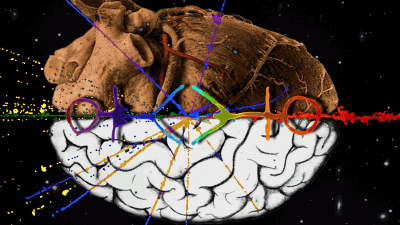Brain and testis are made up of very similar proteins

Men who are too faithful to their sexual desires are sometimes said to 'think with their crotch (lower body).' In fact, a study of the proteins in various organs of the human body revealed that the proteins that make up the brain and testicles are surprisingly similar.
Brain and testis: more alike than previous thought? | Open Biology
Human brain and testis found to have the highest number of common proteins
https://phys.org/news/2021-06-human-brain-testis-highest-common.html
Our Brains Have More in Common With Testicles Than You Ever Wanted to Know
https://www.sciencealert.com/brains-and-testicles-have-more-in-common-with-one-another-than-you-ever-really-wanted-to-know
Genetic study finds the brain is most similar to -- testicles?
https://www.studyfinds.org/brain-most-similar-to-testicles/

The human brain has extremely complex roles, such as controlling the body, receiving and processing signals from the sensory organs, and thinking. On the other hand, the main function of the testes is to produce sperm and hormones, and many people may think that the two are organs that have little to do with each other.
However, in recent years, some evidence has been found that suggests a link between the brain and the testes, and research results have been reported, such as ' brain diseases are associated with male impotence ' and ' men with higher intelligence have better sperm quality .' Intrigued by the link between the brain and the testes, a research team from the University of Aveiro and the University of Porto in Portugal investigated proteins that make up various organs in the body.
The research team analyzed the proteins that make up 33 tissues, including the heart, skeletal muscle, intestine, stomach, liver, kidney, lymph node, cervix, ovary, placenta, prostate, and testis, and compared their similarities. As a result, the brain and testis were found to have the most common proteins compared to other human tissues, the research team said.

According to the research team, of the 14,315 proteins that make up the brain and the 15,687 proteins that make up the testes, 13,442 were common to both. In addition, it was found that the brain and testes have the most common
'More detailed analysis revealed that many of the proteins shared between the brain and testes are involved in tissue development and cell-cell communication. This makes sense, since the brain and testes share many similar functions,' the team argues.
The first thing the research team points out is that the brain and the testes both consume a lot of energy. The brain needs energy to process thoughts and processes, and the testes need energy to produce large amounts of sperm, so there are cells that provide nutrients and support to nerve cells and reproductive cells.
The second commonality between the brain and the testes is that they both use a common process called exocytosis to move substances produced inside the brain to the outside. Exocytosis is a process in which the membrane of a secretory vesicle that stores substances synthesized inside the cell fuses with the cell membrane to release the synthesized substances to the outside. The brain uses exocytosis to release the neurotransmitters it produces for intercellular communication, and sperm cells produced in the testes use exocytosis to fertilize eggs.
The third commonality is that the two have similar defense mechanisms. The brain has a mechanism called the blood-brain barrier that limits the exchange of substances between the blood and tissue fluids, protecting the brain from harmful substances. Meanwhile, the testes also have a mechanism called the blood-testis barrier that protects sperm cells from the blood.

The team believes that the two organs' shared proteins may be a form of convergent evolution : Just as different groups of animals acquire similar traits because they serve similar purposes, the brain and testes may have similar proteins because they have similar functions, the researchers say.
Although only men generally have testes, the female brain also shares proteins with the male testes.
Related Posts:
in Science, , Posted by log1h_ik







